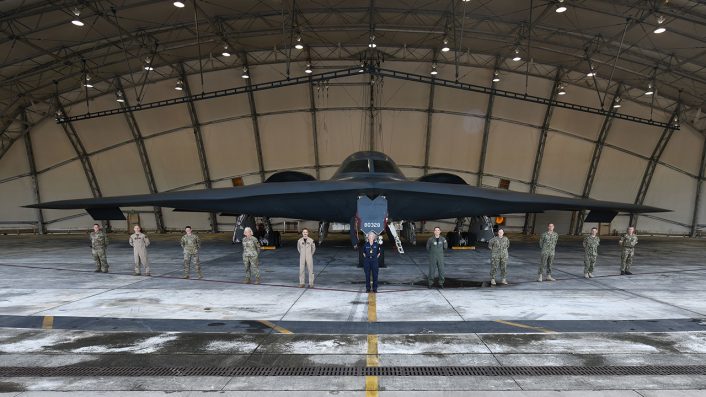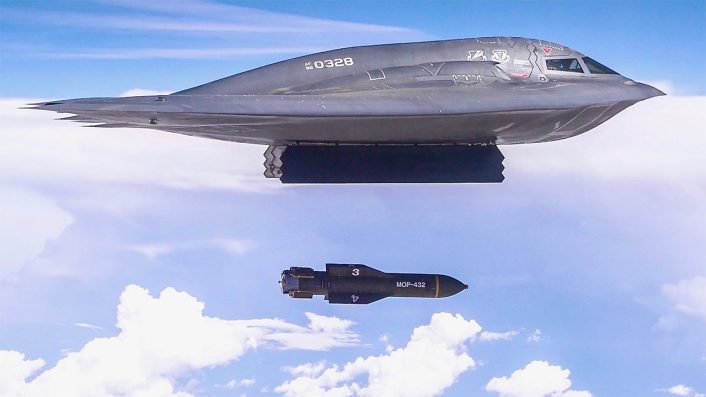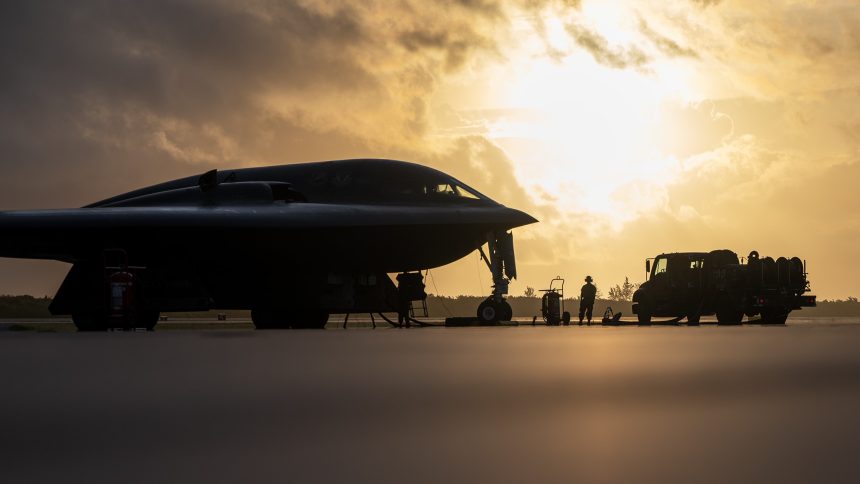Aviation enthusiasts have monitored at least two flights of multiple B-2 Spirit bombers transiting from Whiteman AFB to the strategic Indian Ocean outpost at Diego Garcia.
Using open source information from websites such as LiveATC, Flightradar24, and Airframes.io, some details of a significant surprise deployment of U.S. Air Force strategic bombers have been pieced together by aviation enthusiasts on social media.
Though B-2 Spirits do not use the necessary transponder modes that online flight tracking websites use to display aircraft positions, they do usually correspond with the relevant air traffic control authorities when travelling through friendly airspace. Information gleaned from these communications can be pieced together with altitude reservations (ALTRVs) and the USAF tanker movements that support long range bomber operations to provide a clearer overall picture.
The first flight of aircraft began the transit on Mar. 24, 2025. Callsigns PITCH 11, 12, 13, and 14 were heard, meaning that for at least part of the flight four B-2s (21% of the entire fleet) were in the air.
USAF tankers up from RAAF Amberley Base to link up with a pair of B-2 bombers inbound from Whitman AFB. Should be Pitch 11&12. Pitch 13 diverted to Hawaii due to unspecified emergency.
63-8876, 61-0277, 59-1507 https://t.co/EMqPTRuTfV pic.twitter.com/7xkgqZus9Z
— RivetJoint (@SpeckleBelly64) March 25, 2025
During the flight PITCH 13 declared an in-flight emergency and diverted to Joint Base Pearl Harbor–Hickam, co-located with Honolulu International Airport.
Reverse Ops on YT posted a video of PITCH13 landing in Honolulu with Airport fire rescue following them. https://t.co/WdWpmgXEu8 pic.twitter.com/BnexWjVZuK
— Thenewarea51 (@thenewarea51) March 25, 2025
PITCH 11, 12 and 14 continued the journey and were next heard in contact with Brisbane Centre air traffic control. PITCH 11 and 12 flew as a formation of two aircraft, where one aircraft manages air traffic control contact for two or more aircraft. This is often referred to as MARSA, or Military Assumes Responsibility for Separation of Aircraft.
Four KC-135 Stratotankers, callsigns BUZZ 31, 32, 33, and 34, positioned from Andersen Air Force Base, Guam, to RAAF Base Amberley on Mar. 23 in preparation for the B-2 transit.
PITCH11 flt (B-2 Stealth) & PITCH14 wkg BRISBANE CENTRE westbound over Northern Australia this morning after refueling with BUZZ31 flt & BUZZ34 flt (KC-135) 😎💪
Audio via @liveatc and tracking via @flightradar24 pic.twitter.com/05FT0PmXR5
— Thenewarea51 (@thenewarea51) March 25, 2025
Hours later, another flight of B-2s, callsigns ABBA 11 and 12, were reported leaving the U.S. West Coast heading on a similar routing via Australia to Diego Garcia.
Correction I believe its a flight of x2.
Requested the Block FL270-FL280 For Cross.
— Andy (@Andyyyyrrrr) March 25, 2025
With the remote nature of Diego Garcia, over a thousand miles from the nearest landmass, once aircraft destined for the UK-administered outpost approach the islands it is often no longer possible to monitor their progress using the aforementioned websites. Therefore, it is difficult to be absolutely certain how many B-2s have actually touched down on the tarmac, but the number would appear to be at least four or five airframes.
At the time of writing, no official comment has been made regarding the deployment of B-2s to Diego Garcia. On typical Bomber Task Force (BTF) deployments or Global Power Missions (GPMs) a press release and images are quick to follow in the hours following the bombers’ arrival. Such deployments also usually do not involve more than two or three B-2 Spirits, which are a precious and sparse resource in the USAF inventory.
An Air Force spokesperson did, however, confirm to The War Zone that a B-2 Spirit had landed at Joint Base Pearl Harbour–Hickam.
Alongside the B-2s, a steady movement of C-17A Globemaster III airlifters have been noted en route to Diego Garcia through a number of key U.S. logistics hubs. These include Ramstein Air Base in Germany and Al Udeid Air Base in Qatar. Some of these flights originated from Whiteman AFB, which will be carrying support equipment and possibly personnel for the B-2s.
Significant movement of C-17s into Diego Garcia over the last 2 days:
3/23
AE4F14 as RCH258
AE1238 as RCH851
3/24
AE146C as RCH837
AE0805 as RCH287
AE1177 as RCH894
3/25
AE146B as RCH891
AE4D66 as RCH839
ACARS suggests that these flights are linked on the same mission. https://t.co/FhWc9ejfSn pic.twitter.com/wfmk5xfTwy
— TheIntelFrog (@TheIntelFrog) March 25, 2025
A Notice to Airmen (NOTAM) issued for Diego Garcia on Mar. 25 lists two of the airfields’ parking spots as out of use until May 1, 2025. While this may be purely coincidental, if it is related to the deployment it gives a potential idea of how long it may last. Of course, the NOTAM may be withdrawn earlier or renewed as necessary should the deployment be shorter or longer.
The airfield at Diego Garcia has four dedicated hangars for the B-2 Spirit. Each one can house a single aircraft, and they are climate controlled to protect the stealth aircraft’s delicate radar absorbing skin.

Diego Garcia is now the only known location to use the distinctive B2SS or B-2 Shelter System clamshell-style hangars. These hangars are air transportable and can be constructed in around 70 days. RAF Fairford previously had one B2SS hangar, but it was removed after being damaged in high winds (the base still retains two permanent B-2 hangars, similar to those at Whiteman AFB).
Due to the number of these hangars, if five B-2s have indeed touched down on Diego Garcia’s tarmac we should soon be able to see at least one of them via satellite imagery.
Forward Basing
With the lack of official acknowledgement of a B-2 deployment, it is not unreasonable to beg the question whether they have been sent to the region in advance of potential combat operations.
The U.S. is actively carrying out airstrikes against Houthi targets in Yemen, and B-2s have previously been employed as part of these operations. However, these sorties were flown directly from Whiteman AFB. It is unlikely that operations against the Houthis, who have only limited air defense capabilities, would warrant such a large forward deployment of America’s premier stealth strike capability.
Instead, the thoughts of many commentators have turned towards Iran. The Trump administration has reintroduced strict sanctions against Iran, aiming to dissuade the Iranian government from pursuing a nuclear weapons capability.
President Trump reportedly told Iranian leader Ayatollah Khamenei in a letter that Iran must either agree to a deal or face military consequences. National Security Adviser Michael Waltz told CBS News on Sunday (Mar. 23) that “all options are on the table”.
If the U.S. were to conduct airstrikes against Iran, the B-2 would be one of the first platforms to be considered. Though the bombers are now reaching a fair age, their stealth features remain world class. Perhaps just as importantly, the B-2 Spirit is currently the only aircraft in the U.S. inventory cleared to operationally carry and deploy the GBU-57 Massive Ordnance Penetrator (MOP). Two MOPs can be carried per aircraft.

The MOP is an extraordinarily large 30,000 lb class weapon that is the spiritual successor to the Second World War era T-12 Cloudmaker and Grand Slam ‘earthquake’ bombs. It was commissioned following the 2003 Iraq War, where existing bunker buster bombs were found to be inadequate for the most hardened structures.
It is, in effect, designed specifically for the mission of destroying the strongly protected nuclear, chemical, biological, or radiological weapon facilities and stockpiles of hostile nations like Iran and North Korea. The U.S. Air Force itself describes the weapons’ function as “reaching and destroying our adversaries’ weapons of mass destruction”.
From @theintelfrog.bsky.social, This is likely staging fighters and other equipment (Air defense?) for anti Houthi operations. Prince Sultan is the best-positioned air base with a large US presence near Yemen. So far the US Navy has been conducting the campaign alone, expect USAF will join soon.
[image or embed]
— IntelWalrus (@intelwalrus.bsky.social) March 22, 2025 at 1:26 AM
At the same time as this B-2 deployment, the U.S. Air Force is reinforcing bases across the Middle East with rotations of fighter aircraft including F-35s. For a brief period over the coming weeks, two U.S. Navy Carrier Strike Groups (CSGs) are expected to be operating within the U.S. Central Command (CENTOM) area of responsibility.
Whether these aircraft are solely intended to bolster efforts against the Houthi rebels or are serving a further purpose will surely become more clear over the coming weeks.









